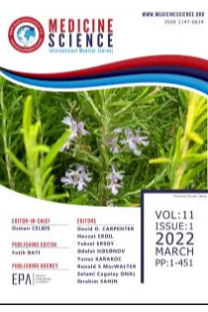Effects of thoracic epidural analgesia on postoperative pulmonary complications aftermajor abdominal surgery
___
1. Patel K, Hadian F, Ali A, et al. Postoperative pulmonary complications following major elective abdominal surgery: a cohort study. Perioperative Med. 2016;5:10.2. Khuri SF, Henderson WG, DePalma RG, et al. Determinants of long-term survival after major surgery and the adverse effect of postoperative complications. Ann Surg. 2005;242:326-41
3. Dimick JB, Chen SL, Taheri PA, et al. Hospital costs associated with surgical complications: a report from the private-sector National Surgical Quality Improvement Program. J Am Coll Surg. 2004;199:531-7.
4. Warner DO. Preventing postoperative pulmonary complications: the role of the anesthesiologist. Anesthesiol. 2000; 92:1467-72.
5. Canet J, Gallart L, Gomar C, et al. Prediction of postoperative pulmonary complications in a population-based surgical cohort. Anesthesiology 2010;113:1338-50.
6. Ballantyne J, Carr D, deFerranti S. The comparative effects of postoperative analgesic therapies on pulmonary outcome: Cumulative meta-analyses of randomized, controlled trials. Anesthesia and Analgesia 1998;86:598-612.
7. Moraca R, Sheldon D ,Thirlby R. The role of epidural anesthesia and analgesia in surgical practice. Ann Surg. 2003;238:663-73.
8. Jammer I, Wickboldt N, Sander M, et al. Standards for definitions and use of outcome measures for clinical effectiveness research in perioperative medicine: European Perioperative Clinical Outcome (EPCO) definitions. Eur J Anaesthesiol. 2015;32:88-105.
9. Hedenstierna G, Edmark L. The effects of anesthesia and muscle paralysis on the respiratory system. Intensive Care Med. 2005;31:1327-35.
10. Hans GA, Sottiaux TM, Lamy ML, et al. Ventilatory management during routine general anaesthesia. Eur J Anaesthesiol. 2009;26:1-8.
11. Popping DM, Elia N, Marret E, et al. Protective effects of epidural analgesia on pulmonary complications after abdominal and thoracic surgery: a meta-analysis. Arch Surg. 2008;143:990-9.
12. Rigg JR, Jamrozik K, Myles PS, et al. Epidural anaesthesia and analgesia and outcome of major surgery: a randomised trial. Lancet. 2002;359:1276-82.
13. Nishimori M, Low J, Zheng H, et al. Epidural pain relief versus systemic opioid-based pain relief for abdominal aortic surgery. Cochrane Database Syst Rev. 2012;7:CD00505.
14. Park W, Thompson J, Lee K. Effect of epidural anesthesia and analgesia on perioperative outcome: a randomized, controlled veterans affairs cooperative study. Ann Surg. 2001;234:560-71.
15. Amini N, Kim Y, Hyder O, et al. A nationwide analysis of the use and outcomes of perioperative epidural analgesia in patients undergoing hepatic and pancreatic surgery. Am J Surg. 2015;210:483-91.
16. Lee CZ, Kao LT, Lin HC, Wei PL. Comparison of clinical out- come between laparoscopic and open right hemicolectomy: a nationwide study. World J Surg Oncol. 2015;13:250.
17. Jiang L, Yang KH, Guan QL, et al. Laparoscopy-assisted gastrectomy versus open gastrectomy for resectable gastric cancer: an update meta-analysis based on randomised con- trolled trials. Surg Endosc. 2013;27:2466-80.
- ISSN: 2147-0634
- Yayın Aralığı: 4
- Başlangıç: 2012
- Yayıncı: Effect Publishing Agency ( EPA )
Medine ALPDEMİR, Mehmet Fatih ALPDEMİR
Arzu ÖZGEN, Erdi BİLGİÇ, Sinem GÜRKAN AYDIN, Mustafa NİZAMLIOĞLU
The comparison of DNA extraction techniques in human bone and tooth samples exposed to high heat
Emel Hulya YUKSELOGLU, Kadir DASTAN, Fatma Cavus YONAR, Gülten RAYİMOĞLU, Ömer KARATAŞ, Dilek Salkim ISLEK, Muzaffer Berna DOGAN
Abdurrezzak GULTEKİN, Funda KAVAK, Aysel OZDEMİR
Ebru Derici EKER, Nilgun Solak TEKİN, Sevim Karakas CELİK, Nefise OZLEN SAHİN
Na+ channel blocker enhances metformin effects on neuroblastoma cell line
Ali TAGHİZADEHGHALEHJOUGHİ, Ahmet HACİMUFTUOGLU, Aysegul YİLMAZ
In vitro investigation of anti-cancer activity of propolis on hepatocellular carcinoma cells
Abdurrahman Alpaslan ALKAN, Eyup DUZGUN, Ali OLGUN, Ece Ozdemir ZEYDANLİ, Murat KARAPAPAK
A. JAYAMOL, DEY MADHUSUDAN, Ipsita SAHOO
Pack in or go on: Topographic disorientation induced by bupropion sustained release tablet
